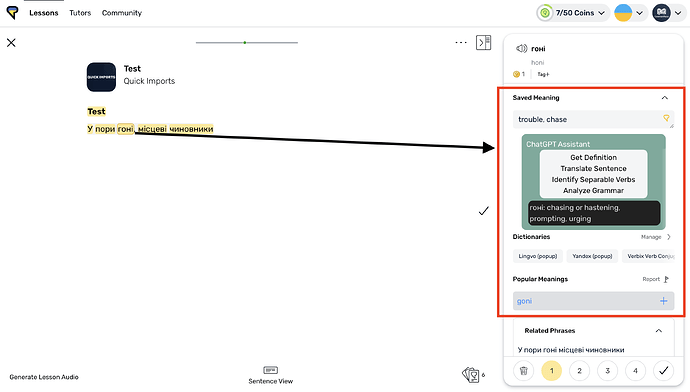The actual and accurate meanings of words, displayed under “popular meanings” in the LingQ Reader, are sometimes lacking / incorrect / nonsense.
Hi, I whenever I encounter new words and click on their meaning, about 50% of the time I am suggested under the “popular meanings” section a bunch of single word definitions / incorrect translations / nonsense, especially in Ukrainian.
For example:
-I read the Ukrainian sentence “У пори гоні, місцеві чиновники” → “In times of persecution, local officials”
-I click on the unknown word гоні
-I only see one definition, and it’s literally “goni”
-I then have to use the google extension to see that the word “гоні” has only one definition, which means chase
-I then have to select the group of words in context, to possibly see a meaningful translation of that word, such as selecting “У пори гоні” to get the English phrase “in times of trouble”
-So after all this, the word “goni” actually has three definitions (trouble, chase, and persecution) which I then have to enter my “Saved Meanings” manually
Maybe I don’t understand how to optimally use the LingQ reader, but I’ve had to do this numerous times in Russian and Ukrainian in LingQ, just to be able to learn the meaning of a word in one context.
And the context in which a word appears does matter a lot to understand it’s meaning, especially when selecting a group of words in LingQ, but it is inefficient that sometimes I have to 1. select the word, 2. select the group of words it appears in, 3. use the google Translate extension, just to understand the meaning of that word in one context.
It seems the suggested “Popular Meanings” are also influenced a lot by how many users there are for a given language, and sometimes I am recommended definitions that are in other languages (ex. Polish, Spanish, Mandarin).
I’d like to know what y’all do to solve this problem. I imagine this is affected by:
-dictionaries and translation extensions having difficulty defining a word, that has multiple meanings and is very context dependent
-the number of dictionaries for a language
-the number of other people learning the language, and therefore contributing to the recommended or generated “popular meanings”
-the LingQ reader having problems “importing” the dictionary meanings
And I believe it could be solved by:
-having a more comprehensive translation extension, that offers multiple/all of the possible meanings of a word (ex. not Google Translate)
-having the suggested “popular meanings” section recommend a first definition that includes all the meanings of that word, based on AI taking them from the dictionaries (ex. гоні = "chase, persecution, troubles)
